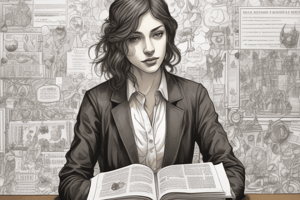Podcast
Questions and Answers
What is the key difference between drawing a conclusion and jumping to a conclusion?
What is the key difference between drawing a conclusion and jumping to a conclusion?
- Drawing a conclusion uses available evidence, whereas jumping to a conclusion lacks sufficient evidence. (correct)
- Drawing a conclusion requires understanding complex vocabulary, while jumping to a conclusion involves simple inferences.
- Drawing a conclusion involves analyzing explicit statements, while jumping to a conclusion depends on implicit information.
- Drawing a conclusion is based on personal opinions, while jumping to a conclusion relies on factual information.
In the example provided, what suggests that the writer might not completely agree with Cicero's self-portrayal?
In the example provided, what suggests that the writer might not completely agree with Cicero's self-portrayal?
- The writer explicitly states that Cicero's claims are false.
- The writer compares Cicero's self-descriptions to a 'perfectly-curated social media post'. (correct)
- The writer uses sarcasm to mock Cicero's achievements.
- The writer praises Cicero's oratory skills but questions his political actions.
Why is it important to avoid 'jumping to conclusions' when interpreting a text?
Why is it important to avoid 'jumping to conclusions' when interpreting a text?
- It encourages readers to rely solely on their own assumptions.
- It can result in misinterpreting the author's intended message. (correct)
- It ensures that the reader agrees with the author's viewpoint.
- It leads to a deeper understanding of the author's personal life.
What skill is most essential for accurately drawing conclusions from a passage?
What skill is most essential for accurately drawing conclusions from a passage?
If a passage describes a character who consistently helps others but often complains about being taken advantage of, what conclusion is most reasonable?
If a passage describes a character who consistently helps others but often complains about being taken advantage of, what conclusion is most reasonable?
In the context of social media, what is the most likely reason someone might selectively share aspects of their life?
In the context of social media, what is the most likely reason someone might selectively share aspects of their life?
Considering the passage about Deirdre and her sister, which of the following conclusions is LEAST supported by the details provided?
Considering the passage about Deirdre and her sister, which of the following conclusions is LEAST supported by the details provided?
What is the main difference between explicitly stating something and implying it in writing?
What is the main difference between explicitly stating something and implying it in writing?
If an author describes a character consistently volunteering for community service, but also includes subtle hints about the character's underlying selfishness, what can a reader infer?
If an author describes a character consistently volunteering for community service, but also includes subtle hints about the character's underlying selfishness, what can a reader infer?
Consider a passage where a politician promises lower taxes and increased public spending without explaining how both are achievable. Which of the following inferences is the most reasonable?
Consider a passage where a politician promises lower taxes and increased public spending without explaining how both are achievable. Which of the following inferences is the most reasonable?
Flashcards
Drawing Conclusions
Drawing Conclusions
Understanding a point not directly stated by combining ideas in a passage.
Jumping to Conclusions
Jumping to Conclusions
Forming a conclusion without sufficient evidence or before all facts are known.
Writer's View of Cicero
Writer's View of Cicero
Cicero saw himself as a savior, but the writer implies this was a curated image.
Drawing Conclusions (Definition)
Drawing Conclusions (Definition)
Signup and view all the flashcards
Jumping to Conclusions (Definition)
Jumping to Conclusions (Definition)
Signup and view all the flashcards
Curated social media post
Curated social media post
Signup and view all the flashcards
Reading between the lines
Reading between the lines
Signup and view all the flashcards
Drawing a conclusion
Drawing a conclusion
Signup and view all the flashcards
Why is the sister hostile?
Why is the sister hostile?
Signup and view all the flashcards
'Fancy new white collar'
'Fancy new white collar'
Signup and view all the flashcards
Study Notes
- Drawing conclusions involves combining ideas in a text to understand a point not explicitly stated.
- Jumping to conclusions means drawing conclusions without sufficient evidence.
Example Passage: Cicero
- Marcus Tullius Cicero was considered a phenomenal speaker.
- Cicero saw himself as the father of his country, the savior of the Republic, and the last true patriot.
- Some high school students compare Cicero's self-descriptions to curated social media posts.
- Cicero deliberately set up a particular image of himself, one that might not be truthful.
- The author implies that Cicero's self-portrayal wasn't entirely accurate.
- The author highlights that Cicero's view of himself appears authentic, but it may not be the whole truth.
Practice Passage: Deirdre
- Deirdre's new job at the bank improved her financial situation.
- Deirdre's sister started acting cold and distant soon after Deirdre was hired.
- The sister sabotaged Deirdre by unplugging her alarm clock and damaging her work clothes.
- The passage implies Deirdre's sister is jealous of Deirdre's new job.
- The sister's comment about the 'white collar' suggests she's resentful of Deirdre's professional job.
- Deirdre's sister may feel invalidated because Deirdre is now earning significantly more.
Studying That Suits You
Use AI to generate personalized quizzes and flashcards to suit your learning preferences.




